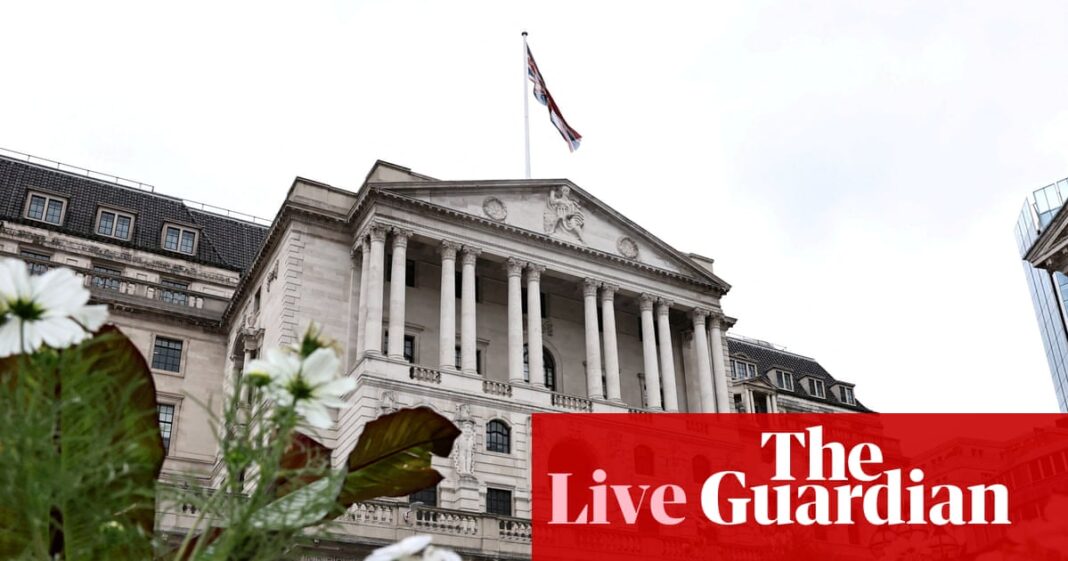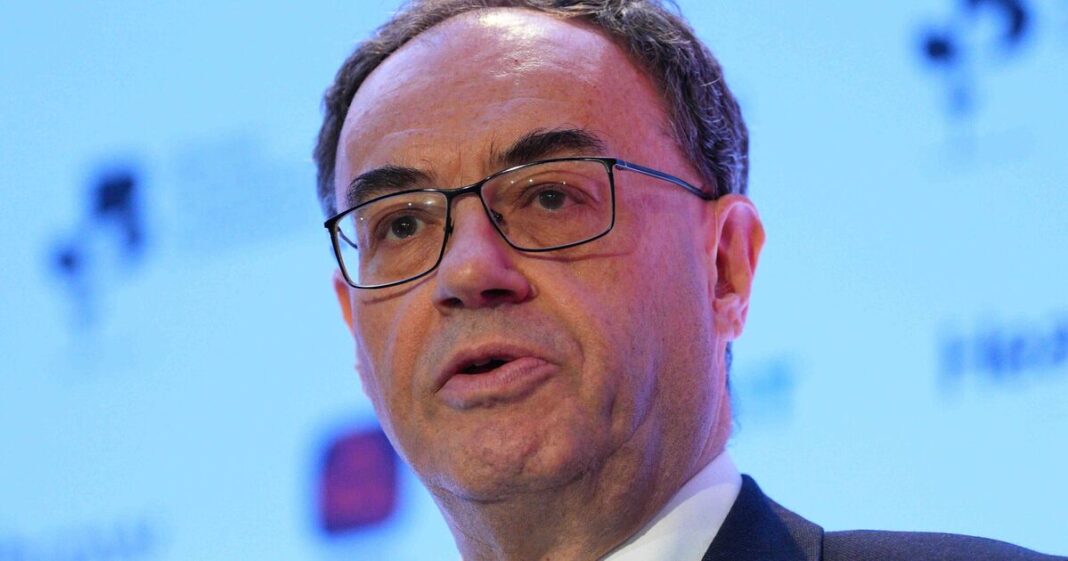Introduction: Will Bank of England cut QT bond sales today?
Good morning, and welcome to our rolling coverage of business, the financial markets and the world economy.
All eyes are on the Bank of England today as it prepares to announce its latest monetary policy decision at noon UK time, but for once interest rates are not on everyone’s mind.
The BoE is widely expected to leave Bank Rate unchanged at 4%, a day after UK inflation remained painfully high over its target at 3.8%.
The real interest is whether it adjusts its bond-selling programme, giving a helping hand to chancellor Rachel Reeves.
Under that “quantitative tightening” (QT) programme, the Bank has been selling some of the government bonds it bought during the financial crisis and the Covid-19 pandemic. QT has come under growing criticism for pushing up borrowing costs — as the Bank’s steady selling has weighed on bond prices, which lifts bond yields.
The Bank is due to make its annual assessment of QT today, and many City economists expect it to slow the unwinding process.
Over the last months, the Bank conducted £100bn of QT, through active sales and by not replacing bonds as they mature. Economists are expecting policymakers will slow the pace of reduction in gilts to around £72bn.
A slowdown in gilt sales would help Reeves by easing the pressure on elevated gilt yields, which hit a 27-year high last month. Lower yields could help give the chancellor some headroom in her autumn budget calculations.
Laith Khalaf, head of investment analysis at AJ Bell, says:
“The gilts held by the Bank of England have turned from making a tidy profit for the government into a costly expense now interest rates have risen and the Quantitative Easing (QE) programme is being slowly unwound.
In essence, we are now paying for the cost of the extraordinary stimulus provided by the Bank of England in the wake of the financial crisis, which started over 16 years and eight chancellors ago. Rachel Reeves is in the unfortunate position of being the mug now holding the enormous bill to present to the taxpayer.
Last night, the Federal Reserve cut US interest rates for the first time this year, responding to signs that America’s jobs market is weakening.
The agenda
-
9am BST: Norges Bank to set Norwegian interest rates
-
Noon BST: Bank of England monetary policy decision
-
1.30pm BST: US weekly jobless claims data
Key events
Next reports falling vacancies and rising applications
The health (or otherwise) of Britain’s jobs market will be on the Bank of England’s mind when it sets interest rates today – and the latest update from retailer Next may concern them.
Next has told the City this morning that its vacancies have fallen across the board, down 35% overall over the last two years, but with deeper falls at its stores.
At the same time, applications have increased by +76%, with applications per vacancy 2.7 times higher than two years ago.
In other words, more people are chasing fewer jobs – a recipe for higher unemployment and lower wage growth.
Next cites three causes:
-
Increasing cost of employment (due to the higher minimum wage, and increased employers’ national insurance contributions)
-
Mechanisation and AI, which are replacing some manual and desk-based functions
-
Increasing legislative barriers to employment (warning that the upcoming Employment Rights bill will reduce jobs and eliminate earnings potential).
The company says:
The pressure on employment is unlikely to be like past recessions, where structural changes have wiped out whole industries, resulting in mass redundancies and regional slumps. These changes are likely to affect people employed in most sectors, and so the effects will be more gradual over time.
Our guess is that most companies will respond to the increasing cost of employment by not filling vacancies, rather than large-scale redundancies (that has certainly been our experience). This, to some extent, is good news because it means we are unlikely to see widespread or sudden economic shocks.
The problem is likely to be felt by those looking to enter the workforce or move jobs – the challenge will be finding suitable vacancies. That certainly resonates with the stories we hear about the difficulties young people are experiencing when trying to find work.
Next also reported strong financial numbers for the last six months: full-price sales rose 10.9% in the six months to July, with pre-tax profits up 13.8%.
Bank of England: What the experts expect
Andrew Wishart, senior UK economist at Berenberg, says there is “no chance” of a change in interest rates today, so the focus will instead be on the pace of quantitative tightening (QT).
Wishart adds:
We expect the BoE to slow the pace of balance sheet reduction from £100bn to £60bn per annum (consensus £72bn). That would both keep the amount of active sales the BoE undertakes broadly steady and decrease the payments HM Treasury (HMT) makes to the BoE to cover its losses, thereby reducing the budget deficit. Slower QT would be a win-win for bond holders.
Kathleen Brooks, research director at XTB, points out that educing QT is not without risk, explaining:
The bonds on the BOE’s balance sheet have been losing value as bond prices have fallen, and yields have risen in recent years. In contrast, the amount that the BOE pays in interest on bank reserves has been rising, and the BOE has required Treasury transfers to manage this.
Ultimately, this will be for the Chancellor to solve, and it could lead to bank taxes included in this Autumn’s budget.
Sanjay Raja, UK economist at Deutsche Bank, suggests the Bank could tweak its guidance on the path of interest rates:
The vote split. We expect a 7-2 vote split to keep Bank Rate on hold. Alan Taylor and Swati Dhingra, we think, will opt for a quarter-point rate cut in September.
The forward guidance. If there’s any surprise in the MPC minutes, it’s likely to come from the Bank’s forward guidance. There are three paths here the MPC can take: one, stick to its current guidance of ‘gradual and careful’ rate cuts, two, tweak its current guidance to ‘gradual and cautious’ rate cuts, or three, simply, drop the current guidance entirely. We place a 40/20/40 probability for each of the three paths. Indeed, there’s a material risk, in our view, that the MPC abandons its ‘gradual and careful’ guidance surrounding the downward path for Bank Rate.
The QT decision. We expect the MPC to reduce its QT envelope from £100bn to £70bn with a landing zone of £65-75bn.
It would be a big shock for the City if the Bank of England doesn’t leave interest rates on hold at midday at 4%.
The money markets are indicating there’s a 97% chance of ‘no change’, and just a 3% possibility of a hike back to 4.25%.
Last month, the Bank’s nine policymakers were badly split – with four voting to hold rates at 4.25%, four favouring a cut to 4%, and one initially plumping for a large cut to 3.75%, before joining the ‘smaller cut’ gang in a second vote.
Introduction: Will Bank of England cut QT bond sales today?
Good morning, and welcome to our rolling coverage of business, the financial markets and the world economy.
All eyes are on the Bank of England today as it prepares to announce its latest monetary policy decision at noon UK time, but for once interest rates are not on everyone’s mind.
The BoE is widely expected to leave Bank Rate unchanged at 4%, a day after UK inflation remained painfully high over its target at 3.8%.
The real interest is whether it adjusts its bond-selling programme, giving a helping hand to chancellor Rachel Reeves.
Under that “quantitative tightening” (QT) programme, the Bank has been selling some of the government bonds it bought during the financial crisis and the Covid-19 pandemic. QT has come under growing criticism for pushing up borrowing costs — as the Bank’s steady selling has weighed on bond prices, which lifts bond yields.
The Bank is due to make its annual assessment of QT today, and many City economists expect it to slow the unwinding process.
Over the last months, the Bank conducted £100bn of QT, through active sales and by not replacing bonds as they mature. Economists are expecting policymakers will slow the pace of reduction in gilts to around £72bn.
A slowdown in gilt sales would help Reeves by easing the pressure on elevated gilt yields, which hit a 27-year high last month. Lower yields could help give the chancellor some headroom in her autumn budget calculations.
Laith Khalaf, head of investment analysis at AJ Bell, says:
“The gilts held by the Bank of England have turned from making a tidy profit for the government into a costly expense now interest rates have risen and the Quantitative Easing (QE) programme is being slowly unwound.
In essence, we are now paying for the cost of the extraordinary stimulus provided by the Bank of England in the wake of the financial crisis, which started over 16 years and eight chancellors ago. Rachel Reeves is in the unfortunate position of being the mug now holding the enormous bill to present to the taxpayer.
Last night, the Federal Reserve cut US interest rates for the first time this year, responding to signs that America’s jobs market is weakening.
The agenda
-
9am BST: Norges Bank to set Norwegian interest rates
-
Noon BST: Bank of England monetary policy decision
-
1.30pm BST: US weekly jobless claims data


